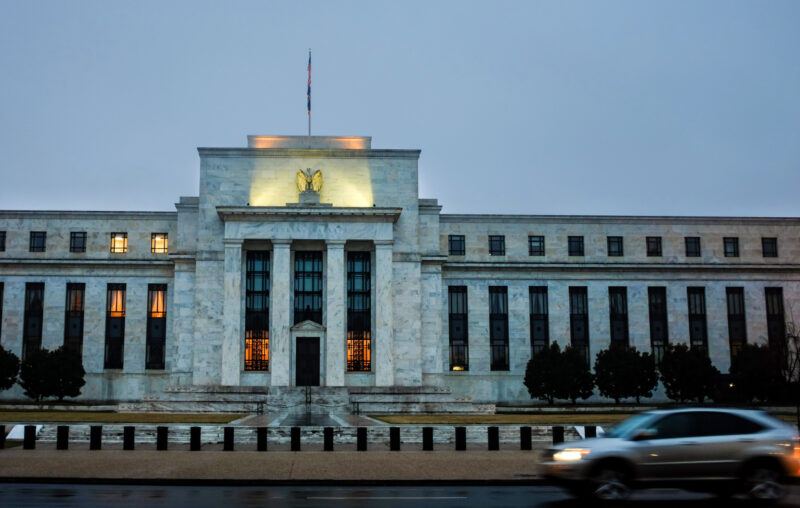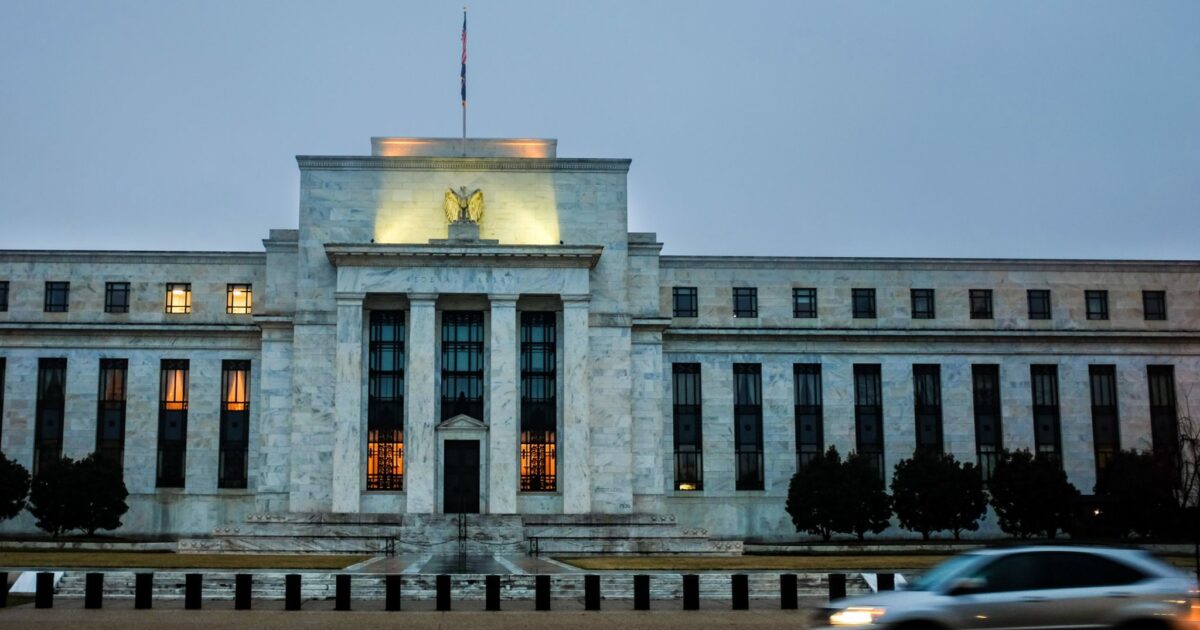
Reprinted from Law & Liberty
Judging from reputable opinion-polling, distrust of public institutions is widespread throughout Western nations today. Whether it is legislatures, courts, or national security agencies, many people across the political spectrum believe that such institutions are prioritizing their own interests and those of the politically well-connected over and above the general welfare. In other instances, the anger reflects an awareness that some of these institutions have failed to fulfill their primary responsibilities.
Central banks across the West presently fall into the latter category. Alex Pollock‘s deft analysis of the Volcker Fed’s war against inflation in the early 1980s reminds us that America, along with most other Western countries, finds itself confronting similar circumstances today. For Paul Volcker’s drastic and ultimately successful measures to curb a major inflationary outbreak occurred against a background of serious monetary and economic policy mistakes in the late-1960s and early-1970s. The same script, Pollock illustrates, is playing out today, with the failure of central bankers to resist political pressures to do what they should not playing a major role in our present inflationary troubles.
No One Likes Admitting Failure
During America’s last inflationary crisis, there were some mea culpas by a few central bankers. Pollock highlights former Federal Reserve Chair Arthur Burns’ famous 1979 lecture, “The Anguish of Central Banking,” in which he acknowledged that central bankers had failed to do their job. There seems far less willingness by their contemporary successors to acknowledge similar failures on their part today.
It took some months before Fed Chair Jerome Powell decided that it was time to “retire” the narrative of “transitory inflation.” Nota bene: Powell did not do so until after being reconfirmed as Fed Chair. It requires no stretch of the imagination to posit that Powell avoided stating that inflation was not in fact transitory because he knew this would have contradicted the White House’s preferred inflationary story (supply-chain issues, etc.). That might have thrown Powell’s renomination by President Joe Biden into doubt. The problem is that the rhetoric of transitory inflation was not the message that markets, businesses, and consumers needed to hear.
No doubt many central bankers do not believe that now is the time for engaging in retrospectives about where they made errors. Their focus, it could be argued, should be on reducing inflation and, equally importantly, getting inflationary expectations under control. Encouraging institutional self-doubt will not help the situation. Ergo, any such examination of conscience is surely better conducted after the inflationary crisis has been mastered.
Perhaps so. But if outfits like the Fed, the European Central Bank, and the Bank of England do get inflation under control, there is good reason to believe that many central bankers will want to avoid too much discussion about what went wrong.
Admitting mistakes is never something that policymakers are especially interested in doing, not least because it raises questions about who should be held accountable for errors. More generally, there are broader challenges facing central banks, many of which go beyond economics, that central bankers may be reluctant to address. Two such interrelated problems concern, first, how central banks restore their credibility in the wake of failure, and, secondly, the meaning of central bank independence in the future.
Not So Independent
From the early-1990s onwards, central banks throughout Western countries started acquiring a reputation for being the adults in the room. As Pollock notes, Paul Volcker was able to state with confidence in 1990 that “central banks are in exceptionally good repute these days.” On one level, this owed something to the political dexterity of leading central bankers like the Fed’s Alan Greenspan and the Bundesbank’s Hans Tietmeyer. At the time, they were widely regarded as safe pairs of hands for monetary policy. This went together with the growth of widespread agreement across the world that central banks should acquire some insulation from political influence.
Insufficient insularity from political pressures had been one reason why central banks had made major mistakes in the late-60s and early-70s. President Richard Nixon’s successful strong-arming of Arthur Burns (subsequently confirmed by releases from the Nixon Tapes) to have the Fed engage in expansionary monetary policy in the run-up to the 1972 presidential election at a time when inflation was growing is one example to which scholars retrospectively pointed. Also driving the move towards central bank independence were empirical studies that began emerging in the 1970s that measured the relationship between such independence and inflation.
So it was that central banks like the Reserve Bank of Australia and the Bank of England acquired some degree of formal independence in the 1990s. More importantly, the European Central Bank established in 1999 was given a primary mandate to “maintain price stability” (as stated in Protocol No 4, Chapter 2, Article 2 of the consolidated Treaty of European Union). The ECB was also given considerable autonomy concerning what tools it could use to realize this. This represented a victory, or so it seemed, for Tietmeyer and the Bundesbank over French desires for an ECB with a wider brief that would enable it to, for example, actively stimulate employment markets.
Such relative independence has not, however, prevented central banks across the world from time and again being drawn into activities in ways that suggest that they are not as shielded from political machinations as many hoped they would be. Indeed, many central bankers plainly believe that they should embrace (or at least not contradict) the broader economic agenda being pursued by governments, even if that agenda distracts the central bank from its prime responsibilities. No state institution, the logic goes, can remain too out of step for too long with the government if it wants to maintain its autonomy over the long term.
Since the 2008 Financial Crisis, for example, the ECB has engaged in several bailouts of insolvent states and operated as a de facto transfer union. Its purported legal basis for these actions has been what is called the ECB’s “secondary mandate.” As stated in the Treaty of European Union, “Without prejudice to the objective of price stability, the ECB shall support the general economic policies in the Union with a view to contributing to the achievement of the objectives of the Union as laid down in Article 3 of the Treaty on European Union.”
One would think that the important caveat contained in this sentence’s first clause would have put major guardrails around the ECB’s ability to stray beyond its primary mandate. But it has not. This is despite Germany’s Federal Constitutional Court finding as recently as May 2020 that the German government had violated the Federal Republic’s Basic Law on account of its failure to rebuke the ECB for pursuing what amounts to a quasi-fiscal policy.
That tendency of governments to say as little as possible about such ECB interventions (and never question their legality) has nothing to do with respecting the ECB’s independence. Instead, it has everything to do with European governments wanting the ECB to engage in such activities, however constitutionally dubious they may be, and however much they may compromise realization of the ECB’s primary objective. After all, these interventions permit governments of countries like Greece and Italy to avoid making the fiscally hard and politically unpopular decisions needed to restore sanity to their public expenditures. An ECB that took its independence and primary mandate seriously would presumably say: “No, we cannot intervene in the way that some governments may want because our authority to do so is at best unclear. Nor can we do anything that prejudices our ability to realize our primary mandate.” But it has not.
A Question of Credibility
Presuming that Western countries eventually overcome their current inflationary woes, and that they don’t find themselves mired in stagflation, a significant challenge for central banks will be how to restore their credibility as bulwarks against inflation. It won’t be enough for them to brag about how they got inflation under control as it will be hard to deny that their errors—like the Fed’s massively expansive monetary policy throughout 2020—helped, as Pollock shows, inflict “the present inflation upon us.”
Some scholars have offered a range of options for addressing such issues going forward. Peter J. Boettke, Alexander William Salter, and Daniel J. Smith have argued that we need to wrap the conduct of monetary policy tightly in basic principles of rule of law, such as the predictability that flows from creating and enforcing rules in a non-arbitrary manner. This, they argue, would limit the scope for central bankers to behave opportunistically and for politicians to encourage them to do so.
This and similar proposals should be given serious consideration. That said, even the best set of rules and the tightest, most targeted, narrowly circumscribed mandate won’t be enough unless central bankers are willing to emulate something akin to judicial restraint. By this, I mean a principled refusal—one that takes on the form of a norm or convention—on central bankers’ part to involve themselves in areas for which others bear prime decision-making responsibility.
By virtue of their monopoly of the money supply and the considerable discretion they exercise in setting monetary policy, central banks are incredibly powerful institutions. That power, combined with the ability of very smart people to find creative ways around the strictest laws (especially during crises), illustrates our need for central bankers willing to say and do what Arthur Burns did not say or do in 1971. A norm and convention that I’ll call “central bank restraint” would help furnish a normative-legal foundation for them to do so.
Underpinning this norm and convention would be a commitment to the principle that central bankers’ specific contribution to the general welfare is to maintain stability in the value of money, and that this means saying “no” to those anxious for central banks to wander away beyond that goal. Certainly, adherence to such a norm and convention would be partly a question of incentives as well as a wider grasp of why observing the underlying principle is important. But it is also a matter of intellectual conviction and moral character.
Put another way, we not only need to find ways of making it more probable that people like Paul Volcker become senior central bankers long before a crisis necessitates putting a Paul Volcker in charge. Central bankers also need principles and procedures accepted as true and correct to which they can point as the lodestone and limits of their responsibilities.
Whether our political class has the requisite imagination and courage to entertain ideas like central bank restraint is a different question. I confess myself pessimistic that they have much capacity to do so.



